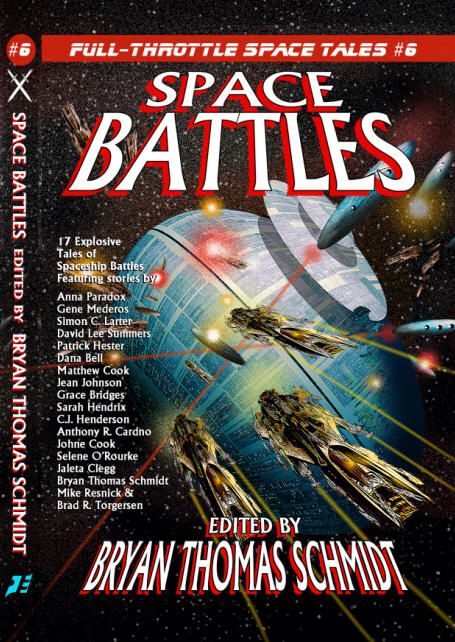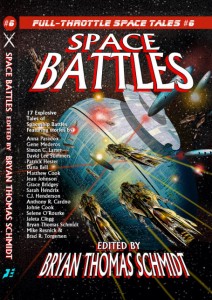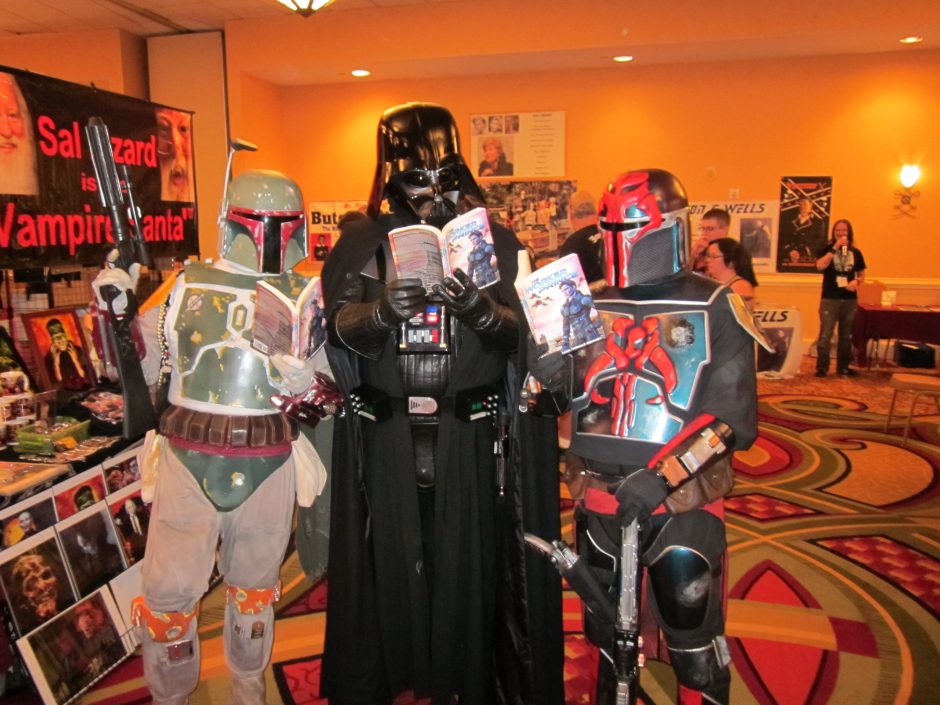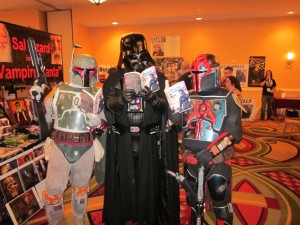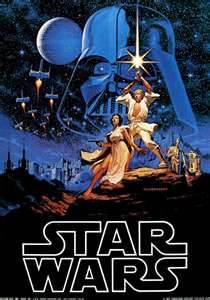If you enjoy anything in the realm of science fiction this is a book I highly recommend you go out and get. The writing is excellent and if battles themselves are your thing, regardless of genre, than this book will suit your fancy just fine as well. Honestly if you just want some quick reads that are done very well Space Battles is a good choice. The characters do not suffer for the short length of the stories, even in Bait and Switch by Jaleta Clegg which is a mere eight pages! Obviously if you have read this far you can tell I thoroughly enjoyed Space Battles. I really don’t have any complaints.
Month: November 2012
Sprunk-Schmidt Original Trilogy Rewatch: Empire Strikes Back
A couple weeks back my buddy and fellow author Jon Sprunk and I decided the time had come to revisit our childhoods and rewatch the original Star Wars movies that changed our lives. Knowing other fans might enjoy sharing the experience and learning how it’s influenced our writing, etc., we decided to discuss it on our blogs. You can find previous posts here, followed by the latest–a discussion of “The Empire Strikes Back.“
Intro & Invitation: https://bryanthomasschmidt.net/2012/11/11/announcing-the-sprunk-schmidt-star-wars-original-trilogy-rewatch-youre-invited/
A New Hope: http://jonsprunk.blogspot.com/2012/11/hello-friends-today-i-have-special-treat.html
Bryan Thomas Schmidt: So Jon, you said watching Empire you found it to be better than you remembered. Give us some thoughts on that, please.
Jon Sprunk: Well, Empire is my favorite movie of the trilogy, and watching it again after a few years just reinforced that opinion. For one, most movie sequels are disappointing, but in Empire Lucas and Kershner flip the script on us. The imperials, via Vader, are the driving force in most of the scenes. For a kid (and an adult) who idolized Vader, that is a powerful device. I really loved the Dagobah scenes. Luke’s training is handled so deftly in scenes that are varied and well-timed that it feels like he’s actually learning something rather than an 80’s-style “training” montage to crappy music. We get more information about the Force, versed in eastern philosophical tennants, which just rings true. In fact, the entire concept of the Force always struck me as elegant–simple enough for a child to grasp, yet full of deeper meanings and symbolism. Also, watching Empire on DVD on a good television reminded how well these movies hold up, visually. Bespin city is just gorgeous.
BTS: And here’s where we diverge. I have waivered back and forth over the years about whether Empire or A New Hope was my favorite. This viewing leaves me feeling that A New Hope is a better film. For one, it’s far more imminently quotable. It’s also more hopeful and encouraging. I found Empire staler on this rewatch, maybe because I’ve rewatched it so often. I have never been a Yoda fan. Whereas you enjoy the training scenes, I found them the most frustrating part of the film. For me, the heart of Empire is the Leia-Han story and the furtherance of Vader’s journey. Luke’s takes second fiddle and is far less interesting. I found Yoda barely more tolerable than Jar Jar. Although, to be fair, in films where Yoda has appeared after this one, I found him easier to stomach. The visuals do hold up impressively. The battle scenes, etc. are amazing. The scenes with the ice monster and tauntauns a bit less so, given what technology since Jurassic Park can do but still, they pulled off amazing stuff considering when they were made. Favorite moments?
JS: The Battle of Hoth is one of my favorite battle scenes of all time. The Falcon’s plunge into the asteroid field–pure gold. I’m so glad they were able to make the ship more agile and evasive, because watching it fly through the asteroids is poetry in motion. I still wonder, though, why Leia couldn’t have been on one of the laser cannons, firing back at the TIE fighters. The scene where Luke enters the evil cave on Dagobah is haunting (and a good foreshadowing of his later duel with Vader). And, of course, the Luke-Vader duel. I still remember seeing it in the theater for the first time and freaking out when Vader reveals he is Luke’s father.
BTS: I love the battle of Hoth. I enjoy the chase scenes through the asteroid. The Bespin escape is a lot of fun as is the freezing Han scene. I also love the Vader scenes with his men, who are so ever expendable. And I too like that Vader-Luke duel in the cave and later the Vader reveal. There are some really great scenes. But I definitely enjoy the action scenes more than the drill training Yoda sequence generally. I also enjoyed the reveal of the Emperor this time around. Did anything disappoint or turn out different than you’d remembered it?
JS: Not too much. Yoda’s animations looked low-tech, of course, but that’s because I’m jaded with the current CGI capabilities. I found the Han-Leia “angry romance” angle a little juvenile in the beginning, but they got to where they needed to be at the end.
BTS: I actually enjoy their banter. It provided some of the best lines and the right amount of tension breaking/escalating humor for me. I really enjoyed the whole ice planet angle, much as I did with the BSG Ice Planet episodes in 1979, some of my favorites. The ice speeders, the Imperial Walkers, the melting in Leia’s chambers, lots of cool new stuff. Also a fun cameo from Cliff Clavin actor John Ratzenberger as the chief Rebel officer during the part where Han discovers Luke is missing.
JS: “Then I’ll see you in Hell!” Aye, I agree. Hoth was a wonderful start to the movie in many aspects. Kershner managed to squeeze in a budding love affair, Luke’s growing powers and new training goal (Dagobah), an escalation of the war (Imperial Walkers ftw!), brought back Obi-Wan for some sage advice… And I think Bespin was a good ending point for the middle film.
BTS: That’s a good point, actually. Middle film. One thing Empire does very well structurally which very definitely influenced me is be a middle chapter. At the end of A New Hope, it feels like closure. Despite the fact Darth Vader spins off into space alive, the Death Star is destroyed, the Rebels have won, our heroes are rewarded. Sure, there are enough seeds and loose ends for us to believe that there’s more we can look forward to, but also it’s enough of an ending that if the film had not been as successful, it could have stood alone fairly well. I really modeled my Davi Rhii series structurally after that. The first book, The Worker Prince, stands alone, despite having villains still alive and loose ends. But the second chapters tend to be harder. With a second movie, you expect more. You expect it to top the first in many ways–emotional arcs, character development, intensity, stakes, etc. But you also expect it to set up future possibilities, most of the time. Like any trilogy, it becomes a challenge then to make such a film and have it truly feel like it has an ending. Empire has all of these aspects–character development in spades, intensity in its darker feel, stakes as Vader goes unchained off to hunt like a madman with no Tarkin to reign him in, etc. But it ends on a cliffhanger and yet feels complete. Because by the end of the journey, it’s almost like so much has happened that we need to come up for air. OMG, Vader is Luke’s father? OMG, Han is frozen in carbonite? OMG, Leia and Han? What about Leia and Luke? etc. Despite the fact we are dying to know what happens next, we feel a sense of the chapter ending and a natural conclusion, even though the story very much goes on. Storytellers can learn a great deal from that.
JS: I couldn’t agree more. Empire is everything I hope my second books could be, take the best parts of the first chapter and build on them in a meaningful way, increasing the stakes while making us care more. And Walkers. And the Super Imperial Star Destroyer. One thing I noticed was that everything was a little bit slicker in the second movie. The sets were more polished, and even the actors were better groomed.
BTS: It’s true. Everyone was more comfortable and prepared. The first movie was a fly by the seat of your paints independent movie with low expectations, the second movie was the sequel to one of the greatest hits in box office history with the highest expectations and the pressure to go with it, so they were extra prepared and also benefitted from everything done and learned for the first film, just as I hope each subsequent book shows author growth learned from prior books.
I also think that from storytelling craft there was growth. They had a lot of back history worked out but Lucas brought on too top notch writers in Leigh Brackett, already a scifi and screenwriting legend at that point, and Lawrence Kasdan, a very smart up and comer. They surely demanded he figure things out that he’d winged before as did the director and the actors. Having read the behind the scenes making of paperback, I know some things were worked out on set as actors like Harrison Ford forced clarifications and changes. Other things had to be worked out with a third movie in mind, since Lucas now knew there’d be one coming. So he was able to complicate and add depth and complications to backstory and character arcs he didn’t bother with or need for A New Hope but which laid ground work and took the characters in directions to allow for a much stronger follow up.
JS: Yes, there is definitely much less making stuff up on the fly in the second and third movies. It’s interesting because I understand the need to throw everything into a first movie (book) because you never know if there’s actually going to be a second or third. But then there is, and you have to figure out some things that you winged or left mysterious in the first installment.
BTS: Exactly. Let’s talk about characters a bit. Empire introduced some important and less so new characters, whom we will see again. Admiral Piett, Boba Fett, Yoda, and Lando Calrissian, most significantly. I personally favor Lando and Boba Fett amongst these, because although he’s a small character, Boba Fett is one of those unpredictable menacing, mysterious badass characters that just keeps you guessing, and Lando fills in backstory for Han in many ways and also, it’s about time they had a major black character. Shouldn’t have taken this long. I love the way Han and Lando are parallel scoundrels yet, whereas Han is all rough edges and seat of the pants, Lando is smooth and refined. Who’s your favorite of these and why?
JS: I wish I liked Yoda more, but I’m not a big fan of puppets in live-action movies (nor most CGI ones, either. Gollum being the notable exception). I guess I’d say Boba Feet for the same reason, even though he goes out like a punk in Return. Lando is a good character, but I think he’d make a better spinoff hero on his own. I never really bought into him becoming a beacon of the Alliance. I think he would have been better served in his own element, fighting the good fight among the scum and villainy of the galaxy’s underworld. Piett… meh. Give me Grand Admiral Thrawn any day.
BTS: LOL Well, if Thrawn had faced off Vader that would have been REALLY interesting. I’d like to see that cage match. Yeah, most of the Imperial officers don’t show any backbone in dealing with Vader after the few Council members with Tarkin in A New Hope, Vader just runs rampant. But then, given his power and influence and ability to choke people, and, well, “the Emperor is not as forgiving as I am,” I’d say life expectancy put a damper on bravery and confidence. Favorite new set pieces/vehicles? The Imperial Walkers are pretty damn cool, although I like the mini-walkers in Return better, myself. I also like the Bespin fighters and the Hoth snow speeders. But my favorite new set pieces are probably Bespin and the Hoth base.
JS: Well, the Millennium Falcon isn’t a new set piece, but it acts differently in this movie. I already mentioned how it’s lightyears more maneuverable, but also it has a stronger subplot arc of its own (the malfunctioning hyperdrive). After that, I liked Bespin (Cloud City) a lot, especially the contrasts between the gorgeous white-and-silver upper city and the dark/gloomy undercity where Luke fights Vader (a second Cave!).
BTS: Yes and the Falcon is always one of my favorites and the one Star Wars toy I never had and still lust after a bit. Sigh. I could make it manuever… heh… From a storytelling perspective, another thing that’s interesting is the way Lucas has woven the subplots and majors together. At the beginning, Vader is hunting the Rebels for Luke. That’s the overarching storyline. Vader is hunting Luke throughout. Then they set up Han-Leia sexual tension that wasn’t as direct in A New Hope but was hinted at by the Falcon cockpit scene where Luke gets jealous when Han asks “Do you think a guy like me and…” That storyline begins with Han daring her to admit her feelings and her denial but then they are thrust together twice, first by fear for Luke out in the cold and then when Han takes her aboard the Falcon to flee. Now they have to deal with each other and their storyline is embossed with a chase through asteroids by the Empire, and then the Bespin visit. The third major plotline is Luke’s quest to be a Jedi and get training from Obiwan’s Jedi trainer, Yoda, which leads him to flee to Dagobah instead of rendezvous with the fleet. With the exception of Luke’s training, all three plots are intertwined throughout, but even at training, there is a sense of inevitability that Luke must face Vader, as evidenced in the cave scene and later when he goes to rescue his friends, bringing them all together again, in a sense. It’s very smart writing and crafting. They manage to pull it off while keeping up an intense pace, not easy to do.
JS: Quite right. And Empire is the first time we see the Emperor (well, a holo-image of him). This sets up the third movie, of course, and gives us a deeper insight into the machinations of the empire. It’s important to know that the Emperor places such high stock on a single person (Luke), and firmly entrenches the idea that the battle between the Light and Dark sides of the Force is just as important, if not more so, than the war between the Alliance and Empire. Then there is Yoda’s line when Luke leaves Dagobah. Obi-Wan says there goes our last hope, and Yoda replies, “No, there is another.” That one line haunted me until the third movie came out, a powerful bit of foreshadowing.
BTS: Yes, and they paid it off nicely which we’ll discuss in Return. I think overall, if I had to sum up Empire, it’s a maturer Star Wars chapter in many ways than either of the others. In Return, Lucas used Ewoks to return to a level of childlikeness that many fans dislike but also that took bite out of the darker aspects, but we don’t see that here. Here the dark overhanging the entire story is a constant. Jeopardy is the watch word throughout: from the jeapordy of the Rebels as the Empire finds them again, to Han and Leia fleeing Vader, to the dark inevitability of Luke’s face off with Vader, and then, “I am your father” with Luke escaping, sans hand, but Han off with Boba Fett. Never in the entire film are we not on the edge of our seats wondering how one or more of our heroes will survive. That lends to pacing and tension but also to a less hopeful spirit than the first film in many ways. And speaking of, “I am your father,” we haven’t talked about big reveals yet. What were your big “Wow” moments?
JS: When Luke lost his hand to Vader, that was a pretty big surprise back when I saw the movie the first time because I had grown accustomed to the idea that the heroes would emerge unscathed from their adventures, and that moment introduced a hint of true mortality which had previously been reserved for nameless stormtroopers and rebel soldiers. Seeing the Emperor for the first time was also big. I still get chills when Yoda lifts the X-Wing out of the swamp. That is why you fail, indeed. Then the entire sequence from when Luke lands in Bespin, shoots at Fett, and then fights Vader is spectacular.
BTS: I agree about the hand and the significance of it, but the symbolism of his replacement hand looking like Vader’s after the “father” revelation also was shocking. If you’d harbored doubts before, then that moment, you just knew it had to be true. I think the mortality of Han was brought into question as well. And we were left hanging. I think the mortality of Han was brought into question as well. And we were left hanging. The X-Wing thing was huge. I also think the revelation of Darth as being humbled by anyone was big. It humanized him as well as reminding us that maybe he wasn’t the darkest evil possible because the Emperor was worse or might be. Also, that Ben could still appear and was still alive in another realm was a really important revelation which became far more important in the next film and prequel trilogy. So that was a big moment. I also think the Han-Leia thing was a bit startling at the time because we were kinda rooting for Luke to get the girl in A New Hope and now he had other goals and needs. But it sure made it easier to transition to the revelations of the next film.
Well, it’s almost time for the third film. I actually tracked down copies of the theatrical releases on DVD and am going to rewatch those for the first time in decades. That’ll be interesting. Meanwhile, any final thoughts on Empire?
JS: My final thought is that I loved it. Empire is possibly my favorite movie of all time. Part of that is surely nostalgia, but part is also due to its importance in the trilogy– the farmboy enters a larger world and faces his enemy on near-equal footing, the scoundrel and the princess find strength in each other, and Vader comes to the forefront as the primary antagonist.
BTS: I still can’t get over the part where you said Vader was your hero growing up, but perhaps if you cry at the end of the next film we can unpack that. Okay, all, we’ll be back next week to discuss Return Of The Jedi. Our first discussions can be found here:
Intro & Invitation: https://bryanthomasschmidt.net/2012/11/11/announcing-the-sprunk-schmidt-star-wars-original-trilogy-rewatch-youre-invited/
A New Hope: http://jonsprunk.blogspot.com/2012/11/hello-friends-today-i-have-special-treat.html
About Us:
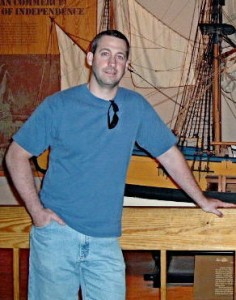





How Not To Respond To Story Rejections aka Whalen Strikes Again
Writers, let’s let this be a write tip for this week, even though I’m not going to bother officially labelling and logo-ing it as such. There’s a writer I just rejected for an anthology I’m doing because he’s burned bridges all over town. How? By this kind of behavior here (my response, kinder than deserved is below it):
http://johnmwhalen.wordpress.com/2012/11/20/402/
Some of you may have heard that there is going to be a Best of Raygun Revival anthology. Raygun Revival was an e-zine that ran on the Internet from 2006 to 2012 and featured space opera serials and short stories. Somebody by the name of Bryan Thomas Schmidt is putting the antho together and it will be published by Everyday Fiction Publishing, an outfit run by a Canadian by the name of Jordan Ellinger, who used to known as Jordan Lapp.
Schmidt had a novel serialized in Raygun after Lapp/Ellinger took it over, and is evidently a fellow who has been busy schmoozing with some name and some not-so name writers, getting them involved in anthologies he’s put together. He funded several of them through Kickstarter, the website that begs the public for money to pay for the cost of making books and movies. He’s going to be kickstarting for the Raygun anthology early in 2013, and the book will be published at the end of 2013.
I was a part for RGR about three of its six year existence. I had stories in about 20 issues. A dozen of them I later re-edited and turned into a novel, Jack Brand, which was published by Pill Hill Press in 2010.
[link removed]
Along with writing stories for the ezine, I also worked as a “Slushmaster,” and in that capacity I would say I had considerable influence on the content of the publication. The Overlords of RGR, the three editors who founded the e-zine, (Johne Cook, L.S. King, and Paul Christian Glenn) made all the final decisions, of course, but I was one of those who had first crack at most of the submissions.
So here we are with a Best of Raygun Revival anthology being put together and, guess what? I’m not going to be in it. And neither are the Overlords, from what I gather. Why is this? you might ask. Well, for one thing, the original editors and publishers are not really involved in this project. The Overlords are evidently in a cryogenic state somewhere in a pod circling one of the moons of Mars. Darth Lapp/Ellinger has control of the publication currently, and Jabba the Schmidt seems not to be too much on the ball. He sent me an email Nov. 14 telling my story, “Kiss Me Now, Kill Me Later,” was “in final consideration” for inclusion in the anthology, which surprised the hell out of me since I had no idea there was going to be such a thing. I expressed my thanks for being in the running. His email requested I send him a copy of the manuscript of the story and I did so on Nov. 18, four days later after getting the email.
Needless to say I was pretty happy to be part of the book. But hours later, I got a response from Schmidt saying unfortunately “due to a kickstarter, I had very tight timeline and I finalized the table of contents Friday [Nov. 16]. It was decided not to include manuscripts I did not have, including yours.”
I’ve been a writer for a long time, now, and I have to say I was totally shocked to get a response like that. I’m not sure I totally believe it. But one thing is clear, the haste with which this thing is being thrown together doesn’t bode well for the proposed anthology. For one thing, the book purports to be a “best of” collection, but in fact, looking at the posting on Schmidt’s Website describing the book, it looks as if it will contain a smattering of stories from some of the original writers, and quite a few new stories by some “name” writers.
These are stories that never appeared in the e-zine by writers who never would have deigned to appear in the publication in its “golden age,” when it was fighting its heroic battle to survive. From 2006 to 2010 RGR hardly paid anything to its writers. We got involved because of love of the genre and because RGR was the only publication with its own particular brand and style. It was a one of a kind labor of love by people who cared.
Now writers like Dean Wesley Smith, Kristine Katherine Rush, Sarah Hoyt, and Mike Resnick, among others, are lined up to write new stories or contribute reprints. Where were they when RGR was barely getting enough submission to fill an issue? The Overlords, I’m sure, would have been grateful for even a crumb of a story from one them back in the day.
Looking at this matter in a longer perspective, I should be glad not to be a part of this effort, but I’m not. I’m mad about the way my story was handled. And I’m kind of sad because the anthology seems more like an attempt to dig up RGR’s corpse and make a profit on the remains. My only hope is that the Overlords, wherever they are, rouse themselves from cryogenesis, overthrow Darth Lapp/Ellinger and Jabba the Schmidt, and someday soon put out a real “Best of RGR Anthology.”
My response and it’s kinder than deserved:
Let me make this VERY clear, John. I read tons of stories for this. I was very prepared to include yours. But then I was informed of numerous cases where you have posted these very types of posts talking out your ass and badmouthing editors, cursing them out, insulting them and insulting RGR and the people involved and told in no certain terms that EDF will not do an anthology with you involved. Having already finalized and sent your story request, I had no choice but to honestly say we had closed the TOC, which we did, without waiting for your story. But if it makes you feel any better, not that I care because you are clearly showing no respect for me or anyone else, we are not including serials and we are not including any reprints over 5k words. Yours is over 6k. Say what you want. I’ve worked hard to get where I am. I’ve earned the respect I’ve got. And frankly, no one owes you anything. You have made your bed. Lie in it. And understand that I’ll be posting this on my blog for industry folks as a prime example of the kind of unprofessionalism you’re known for.
Don’t be an asshat, people. It’s not worth it.
I leave you with the response from the publisher on Whalen’s blog:
-
John,
It was my call to exclude you from the magazine, and I did so not because you’ve sent us abusive e-mails in the past, or because you’ve accumulated quite a reputation for yourself among other editors (we do talk to each other), but because of one of your posts on this very blog (http://johnmwhalen.wordpress.com/2012/08/18/the-body-count/ ) where you implied that you weren’t a fan of the magazine as it was “under Ellinger”.
I concluded from that post that you weren’t likely to be interested in the anthology and asked Bryan to go ahead without you.
Announcing Raygun Chronicles: Space Opera For a New Age Contributors
Here’s the scoop on my latest anthology project:


Raygun Chronicles: Space Opera For a New Age
Edited by Bryan Thomas Schmidt
A collection of best of stories from Ray Gun Revival’s multi-year run combined with new stories from headliners. Ray Gun Revival is all about space opera and golden age science fiction. A Kickstarter will be running in January and February 2013 to help fund this project. It will be published November 2013 by Every Day Publishing with a launch at OryCon in Portland, Oregon.
Along with classic Raygun Revival reprints, we’ll have new stories from the following headliners:
Dean Wesley Smith, Kristine Kathryn Rusch, Sarah A. Hoyt, Robin Wayne Bailey, Brenda Cooper, Seanan McGuire, and Allen Steele
We’ll also have new stories from up and comers:
Peter J. Wacks and Keanan Brand along with reprints from headliners Mike Resnick and A.C. Crispin, a story which has never appeared in short form before.
Expected Reprint contents are as follows (depending on space):
[Table of Contents Order To Be Determined]
Mike Resnick – Catastrophe Baker & The Ship Who Purred
A.C. Crispin – STARBRIDGE: Twlight World
Milo James Fowler – Captain Quasar & The Insurmountable Barrier of Space Junk
Michael S. Roberts – Sword of Saladin
Michael Merriam – Nor To The Strong
TM Hunter – Ever Dark, An Aston West Tale
Robert Mancebo – Slavers of Ruhn
Alice M. Roelke – The Last, Full Measure
Lou Antonelli – The Silver Dollar Saucer
Paula R. Stiles – Spider On A Sidewalk (Writer’s Of The Future Winner)
Jenny Schwartz – Can Giraffes Change Their Spots?
A.M. Stickel – To The Shores Of Triple, Lee!
Shaun Farrell – Conversion
Jennifer Campbell-Hicks – Malfunction
Cover Art from Writer’s Of The Future Winner Paul Pedersen
About The Editor:
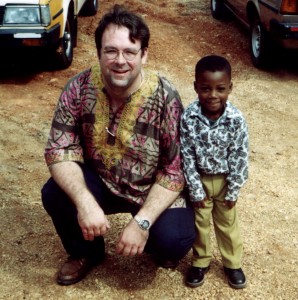



Write Tip: Advice From The Slushpile-8 Common Mistakes To Avoid In Submitting Manuscripts




1) Read Guidelines-All editors have them somewhere. They exist to give you an advantage. Ignoring them is stupid. Why? a) If I’m an editor telling you what I want to see, with competition for story sales being what it is, why in the world would you not use this to your advantage? b) If I told you how I want submissions to look and be done, ignoring it is telling me you either don’t respect me, don’t care or think you’re above it. All three are the signs of not just unprofessionalism but an attitude that bodes negative things for our working relationship.
2) Use Standard Formatting-You don’t have to like it. We don’t care if you find it annoying. We don’t care if it seems old fashioned. It’s industry standard for reasons from tradition to ease of import for programs like Adobe InDesign, so just do it. Examples are rampant, but one of the most respected comes from Bill Shunn and can be found here. He even offers samples to download. Take advantage of it and get it right. Our guidelines will tell you if you except any variant, if not, show us you’re professional and at least meet the standard.
3) Use Spellcheck-Some typos fall under things we can forgive: the occasional missed word, for example. A missed period or capital letter on occasion. Words that are actual words but not the one you missed. If you read your story aloud or have betas read it before submission, you’d likely catch them, but at least they are things that can happen to anyone. In the case of words that any basic spell check ought to catch, there’s just no excuse. “Matter” and “mater” are not the same word. “Rond” instead of “round” is something that just shouldn’t be missed. If you don’t care enough to make the simplest effort to get it right, why should we read your story or care about it?
4) Keep Cover Letters Short-Folks, I am a slush reader. I get tons of submissions. I don’t want your life story. I don’t want your brown nosing. I just want good stories. Don’t write me long letters about admiring me and the zine, etc. Tell me your name, the name of the story, the word count, any relevant publications (i.e. markets I’ve heard of), thank me, sign your name and attach the file. Keep it simple. If I want a full bio or list of credits, I’ll ask for it. Unless your mother is an industry luminary, her opinion has no value to me. That goes for any other relatives or friends in your inner circle. And don’t lie about it either. I know lots of people. I can probably verify the truth of it if I get curious. Don’t make me think you’re up for wasting my time before I even get to your story. TRUST ME.
5) Include Your Contact Information-This is part of standard formatting. Again, you can find it here. But really, if I want to send you a contract, email you or mail a check, don’t make me go through twenty steps to track you down. Put it right on the story, before the title and byline. Name, Address, City, State, Zip, email, and if you’re a SFWA, Codex or other member. Phone number can be helpful too and is a good idea. That’s it. Word Count across the page. Boom. Make it easy to deal with you. We have to deal with so many writers, the ones who make it easy definitely make the best impressions.
6) Spell My Name and Title Right-Yeah, it sounds obvious but my name is BrYan not BrIan. It’s right on the guidelines. It’s on the staff page. It’s on my bio. If you don’t care to get that right, then I can assume you aren’t concerned about the details of anything else either. It’s also a sign of simple respect. Simple respect and politeness go along way in businesses where relationships and networking play a key role. This is one of them so be polite and have respect.
7) Read Up-Read copies of the magazine or anthologies I’ve edited. Read my blog. Ask writers who’ve worked with me. Find out about my likes, dislikes, etc. in any way you can. It’s probably in my guidelines, but sending me stuff that will automatically get rejected like erotica, porn, gratuitous sex and violence or often non-family friendly stuff (I state specifically for each project what the limits are) is going to waste both of our time and leave me again feeling that you’re either lazy, disrespectful or cocky. None of which makes me remember your name as someone I’d like to work with.
8 ) Use The Right Submission Address-Yes, often my personal email or editor’s box email is available. There are all kinds of reasons for this. But if the guidelines tell you to submit stories to another address, unless I specifically asked you to do otherwise, use the address as instructed. I’m a nice guy. I try and treat people the way I want to be treated. I’m not at the point where I am so tired of writers making these mistakes that I’ll reject a story out of hand for them, but I can see why editors do this. I get tons of email like anyone else. Having paths I use for various types of email help me keep it organized. Don’t think you’re an exception to the rules unless I tell you. I have the rules for a reason.
I think what makes these errors so annoying in their commonness is that they could be so easily avoided. If you writers don’t take your career seriously enough to get the easy stuff right, it’s hard to trust that you’ll be serious about the big stuff, and that tends to leave an impression that you are someone we might not want to work with. In any case, something to consider and take seriously. For what it’s worth…




Announcing the Sprunk-Schmidt Star Wars Original Trilogy Rewatch: You’re Invited
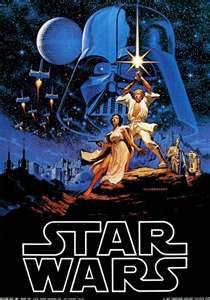


The Hosts: Jon Sprunk & Bryan Thomas Schmidt
The Invitation To You: Rewatch the original trilogy in order, one a week, and join the conversation.
Jon and I are of an age where the release of the original Star Wars: A New Hope to theatres in 1977 remains a seminal moment. Bef0re that, while stories were fascinating, the possibilities had limits. Star Wars: A New Hope changed all that. It opened up possibilities for our imaginations that went beyond anything we’d seen before. From its state of the art special effects to its return to a classic storytelling style, Star Wars captured the public and never let go, launching a franchise, a legend, and an empire.
For me, Bryan, Star Wars infused my sense of what I wanted stories to be and the kind of stories I strive to tell, from witty banter to lots of action and large scale, my own Saga of Davi Rhii has been said to capture “the Star Wars feel,” and my forthcoming epic fantasies surely show that influence as well. I still enjoy a good space opera book, Star Wars tie-ins included. And I still like hopeful stories of good v. evil and the possibility of real heroes one can look up to and admire. One of my all time favorite sequences is still the opening battle of A New Hope, and I also still love the escape from the Death Star and the Battle of Yavin tons. There was something about the coming of age, innocent Luke that still attracts me, and I’ve used similar elements in both my Davi Rhii and Dawning Age novel series as well as some short stories.
Jon says: “I was seven years old when A New Hope arrived in theaters. I saw it seventeen times that summer. Never before had a movie—or any story—affected me so profoundly. The original Star Wars films were basic enough that a child could understand them, with their larger-than-life battles between the Empire and the Rebellion. Yet they were also dynamic enough to enthrall an entire generation of wannabe X-Wing pilots, smuggers, Jedi, and Sith Lords. It wasn’t until I was much older that I started to appreciate these films for their technical aspects, especially A New Hope, which I consider one of the most structurally-perfect movies ever made. There is no doubt that a little bit of Star Wars infuses my writing, no matter the subject or genre.”
So, starting this week, Jon and I will watch Star Wars: Episode IV A New Hope and dialogue about it. That post will go up on his blog. We’ll talk about things we like and don’t like and why, how we react to them now as opposed to when we first encountered them as children, influences on our writing, genre, and so much more. You’re invited to join us in comments. We think it’ll be a lot of fun.
So let’s take a trip back to a galaxy far, far away together. We look forward to engaging with you.
Our conversation begins on A New Hope here: http://jonsprunk.blogspot.com/2012/11/hello-friends-today-i-have-special-treat.html
About Us:






Blue Shift: Call For Submissions & Slush Readers



Guidelines:
Who we are:
Blue Shift is the science fiction specific periodical of White Cat Publications, LLC. Our goal is to present the very best examples of the genre we represent. We are a bi-annual publication publishing short stories, flash fiction, interviews, reviews, and columns for print and digital download.
What we seek:
We are interested primarily in good quality writing in the sci/fi genre. We will consider stories of any variant of this genre. We desire First English Language serial print, audio and digital rights so that we might present your work in all formats within the magazine.
How we want it formatted:
All manuscripts should be .rtf or doc/docx format and follow the industry standard for formatting (here is a great example: http://www.shunn.net/format/story.html ), however, please make the following changes:
Words in italics should be underlined even in New Times Roman; it’s easier for our design people to see.
Em dashes must touch the words on both sides of them
Ellipses are three dots and do not touch the words on either sides of them. Please use them sparingly.
Please do not use hard returns to indent.
Please use single space, do not double return between paragraphs.
Please do not double return after periods.
All submissions that don’t meet our guidelines will be rejected. We’re trying to improve our response times to submissions, but please bear with us as we gear up to handle a larger than expected volume of stories. Simultaneous submissions are fine with us, just let us know. We’re all writers here and we’re happy when fellow writers sell their work anywhere they can. Since we’re a bi-annual magazine, we strive to respond to all our submissions within three months. Due to the volume of submissions, however, please be patient.
What we pay:
Short Stories and flash fiction: We accept stories up to around 5,000 words in length, three cents per word up to 5,000 words. Reprints are paid out at one cent per word. Send these to[email protected]
Interviews: Query first. The rate is $15.00 per interview. Please submit these to blueshiftmag[email protected]
Reviews: Query first. We are always interested in reviews of genre related books, music, games, products, etc. The rate is .03 per word up to 500 words. Please submit these to blueshiftmag[email protected]
Articles and columns: Query first. We are always interested in engaging and entertaining articles about fiction and non-fiction subjects. We pay .03 cents per word up to 1,000 words. Please submit these to blueshiftmag[email protected]
Art: While we have a couple in-house artists, we’re always looking for more variety. Please send a link for your site to blueshiftmag[email protected]
All the above items require a short bio, preferably with a 300 dpi or better picture of yourself. We also require a picture (again, 300 dpi or greater) of the subject, where applicable. Please let us know if you prefer Paypal or money order and your email/address you would like used. All payments are sent within 45 days of publication.
Slush Readers:
I need people who can read stories and give me brief analysis. I’ll have a worksheet with specific questions. My aim is to process stuff quickly so I’d like 3-4 readers. At this time, I can not offer monetary compensation but I can offer mentoring, a chance to grow in knowledge of story, genre and editing, and an inside look at the submissions and publishing process in regards to a zine. You won’t be allowed to submit while working for us, at least right now. We don’t want accusations of favoritism. But we’ll try and make it pay off in other ways, including free story critiques from time to time and the opportunity to do reviews and nonfiction articles for the zine (pay rates to be determined). I can tell you from past experience that editing and slush reading are both highly educational and good experiences to have as writers and editors up and coming in the business.
To apply, please email me at [email protected]. (NO STORIES should be sent here. In fact, unless I specifically asked you to send it to me directly, I’ll reject it and ask you to submit properly. The submissions email is for organizing the queue.)
Thanks much. I look forward to working with you.




Write Tip: 5 Keys To A Successful Freelance Editing/Writing Business




1) Diversity — You need to develop your knowledge not only of diverse software but types of writing and editing. From technical to creative, marketing to fiction, you should be familiar with Microsoft Word, Microsoft Publisher, Microsoft Visio, Adobe Photoshop, Adobe Standard/Reader and anything else you can get your hands on. The needs of the jobs vary but being diverse in not only the types of materials you can offer as well as the types of software platforms you are familiar with will really give you the most opportunities. It takes time to develop this, and, perhaps, money if you need software. Some of it can be bought used for much less price. Free classes can often be taken online. Whatever the case, you should develop skills as much as possible in as many areas as you can. And you should build portfolio samples to demonstrate them.
2) Disciplined Hard Work — There’s no way around this. If you want to make money doing this, you must treat it as a job. Set aside specific hours, keep track of them and your tasks, research proper invoicing and rates, track expenses and dedicate the necessary time to work. I have both a daily planner and large desk calendar I use as well as my computer and smart phone to track projects, deadlines, hours, etc. I also track when I bill clients, when they pay me, how much I am owed, bills, etc. I keep a large queue of projects going: https://bryanthomasschmidt.net/2012/10/28/works-in-progress-writing-editing-projects-i-am-working-on/ is my latest list. And I prioritize both based on deadlines clients ask for, when I receive them, type of work, etc. I am honest and up front with clients when time gets off schedule and I work hard to make sure they are kept abreast of all developments. In return, I am developing some steady clients who come back to me and recommend me to others. You must discipline yourself. You can’t be fly-by-night if you want to succeed. Clients do expect fast turn around and high quality. They have a right to when they’re paying you $25-30 an hour and expecting to get good advice. And it means you have to sometimes put your personal projects aside and put the paying projects first. The only way to keep room for your personal projects, in my experience, is to be disciplined and schedule your time well.
3) Networking/Reputation — Almost every opportunity you get will be the result of referrals or tips from someone else. So building a good network and reputation is very important. Not just a reputation as a nice person either. Although my approach of treating people the way I want to be treated is definitely paying off, so is my reputation for meeting deadlines, going out of my way to help and encourage clients, going the extra mile from time-to-time when it’s called for and always doing quality work. Consistency in all of these things will be vital to your success and I highly recommend that you figure out what they mean for you and how to deliver them early on. A big part of this relates to deadlines and billing. Every client wants it yesterday. No one is patient when it comes to this stuff. But if they want quality, they have to give you the time to do it. I always estimate longer than I need so if things come up I am covered for delivering late. It’s far better to please them by turning things in early than disappoint them by being late. The same is true of billing. Estimate higher than expected. Surprising them with a smaller bill than expected makes them smile. Surprising them with a higher bill than expected never does. In fact, it can cause conflict. So don’t create potential conflict by failing to allow for delays and unexpected circumstances.
4) Multitasking — You will have to have the discipline and dedication to juggle multiple projects. There’s no way around it. And it can be hard. It’s hard to edit more than one book at a time. For me, editing a novel and a nonfiction piece can be done simultaneously. I can also edit short stories while editing a novel. Editing two novels at the same time is too hard. You get confused on story elements, voice, pacing, etc. and it slows you down, so I have to keep that in mind when setting up my queues. I tell the clients where they are in the queue and when they can expect me to deliver, and if that changes, I inform them why and how much extra time they should expect. I also offer discounts for larger jobs. You can’t live on one job, so you’ll need several. I spend an hour or two a day doing marketing work, an hour or two paid blogging, and at least four hours on editing, every day. My personal writing time comes beyond that. But at $25-30 an hour, again, I am averaging $125-150 a day which, 5 days a week (I actually work 7 right now) will add up to around $30-40k a year.
5) Marketing — A big part of your marketing is word of mouth. There’s no way around it. But you should also have a website with rates, client blurbs, a list of projects, a bio, and a blog containing helpful tips, talking about your process etc. Put links to this in your bios and email signatures, and spread the word when you can. Ask clients for referrals. Ask friends as well. Let people know what you’re doing. Do some free work in the beginning to prove yourself. Also sites like www.fiverr.com offer the opportunity to demonstrate what you offer at lower rates that can help you build up your client list for later. In the beginning, you start out as an unknown, so you have to make effort to show people you’re capable. From doing websites for people to marketing materials, beta reading critiques, story critiques, and even editing, you can get people talking about and recommending your work. That brings you to the attention of people searching for someone to help them. It takes time. I did so much volunteering for three years and now it’s paying off. From www.fiverr.com 30 minute editing jobs for $5 to editing an anthology gratis to prove myself, I did what I had to, and I’m grateful it’s paid off.
I’m sure I can do more posts on this if it interests people, but that’s enough to really get you started down the right road. I hope it helps both direct and encourage you. I know it’s worked for me, and I hope it continues to. I hope it works for you, too. For what it’s worth…





